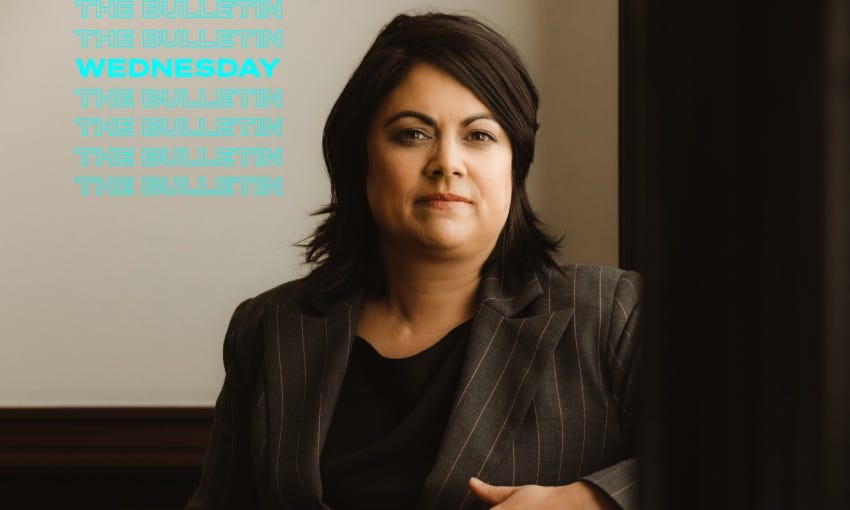Rapid Covid tests are here, but you can’t bring them home
Use of antigen tests could be extended beyond unvaccinated travellers, but the government doesn’t have plans for a national surveillance programme
Mōrena and welcome to The Bulletin for Wednesday, December 15, by Justin Giovannetti. Presented in partnership with Z Energy.
In today’s edition: Auckland’s lockdown ends after 120 days; National soars in first poll with Luxon; townhouse bill clears parliament; but first, Ayesha Verrall talks about the future of rapid tests.
Since being elected to parliament last year, infectious disease expert Ayesha Verrall was promoted to cabinet and is now the country’s de facto testing czar.
Today marks a significant expansion of the country’s rapid testing programme. Unvaccinated travellers leaving Auckland now have access to rapid antigen tests to fulfil new Covid-19 testing requirements. The rapid tests, with the unfortunate acronym of RATs, have been a mainstay of some overseas programmes to contain the pandemic, but their use has so far been minimal in New Zealand. The tests will be free for unvaccinated travellers until the end of January—the ministry hasn’t figured how how much they’ll cost after that. The next two months will serve as a trial of sorts to discover how well they work in New Zealand, associate health minister Ayesha Verrall told The Bulletin, but there’s no plan to massively expand their use.
Confused about the difference between tests? The Spinoff has a guide, looking at the strengths and weaknesses of each.
Rapid tests won’t be available to everyone and aren’t a replacement for vaccinations. It would be kind to describe the government’s unveiling of the rapid testing programme in November as muddied. What’s in place from this morning is far more limited than what had been hinted at only a few weeks ago, but Verrall says there’s been no change in strategy. The rapid tests are only available to unvaccinated travellers, who need to use them in pharmacies, under the supervision of pharmacists. Businesses and health workers also have access to them as a form of surveillance testing.
“Rapid tests are an adjunct to our overall approach to testing, the diagnostic test that still performs best is the PCR and if you have symptoms you need a PCR test,” said Verrall. Anyone who tests positive at a pharmacy, or has symptoms, will be sent to get one of the nasal swabs we’ve grown used to seeing.
What happens after January 31, when the tests aren’t free anymore? “They will be available at cost for some. You’ll continue to need one if you’re unvaccinated to fly on a plane—that’s what we anticipate. Aged care facilities might ask for them in certain settings for screening visitors,” she said. Requiring rapid tests won’t reduce any existing restrictions, she quickly added. Staff and residents will still need to be vaccinated, as well as a strict policy maintained on mask use. Rapid tests are always an add, not a replacement.
Rapid tests are likely to be used in future outbreaks. Beyond aged care homes, other settings will be considered after January. Where they’ll likely find a use is in an outbreak, especially one that is remote, Verrall said. Because the tests don’t need access to laboratories, they could help screen a population that would otherwise be hard to reach. According to the minister, 98.3% of New Zealanders live within 20 minutes of a pharmacy that has the tests. However, as One News reports, there have been a number of pharmacies who have reported not receiving their test supplies yet.
Don’t expect them to become take-home tests like overseas. The government has orders for monthly deliveries of 1.5 million rapid tests for the first half of 2022. While it’s a significant number, it’s not enough for a broad surveillance effort or a European-style programme where people are given half a dozen tests to take home and use when needed. One of the big issues here is that the government wants to know about positive results, Verrall said.
“I understand that in some other countries that sort of wide-scale rapid antigen testing is available, but the building of a public health system around that and to get the right action taken on the test result, would be an important part of it. It’s not our current plan, we’re currently using it in a much more targeted way.”
2021 will be remembered for the spread of delta, creating one of the most challenging stories—and commercial environments—in recent memory. It made us rely even more heavily on the support of our members. If you love what we do, please consider donating today. Want another way to support us? Invite your friends and whānau to subscribe to The Bulletin and keep them across Aotearoa’s biggest stories.
After 120 days of lockdown, Aucklanders begin to travel again as border opens for vaccinated and recently tested. The Northern Advocate reported from the city’s northern border after midnight as cars crammed with luggage and towing boats headed towards a holiday. Checkpoints manned by police and local volunteers verified Covid-19 records in what was described as a smooth operation. Police also spoke with RNZ and said that while not all cars will be screened at the border, any that appear to be carrying holidaymakers will be stopped and records checked.
The Covid numbers: There are 62 cases in hospital and 4 in ICU/HDU. There are now 9,890 cases in the delta outbreak. 51 new community cases were reported in Auckland yesterday, 21 in Waikato, 7 in Bay of Plenty and 1 in Taupō. 18,527 people were vaccinated on Monday.
The Spinoff’s Covid data tracker has the latest figures.
First poll with Luxon as National leader shows surge in support. While it might not be Luxonmania yet, National’s ongoing decline in polls has suddenly reversed course with its new leader. The results are a dream for Christopher Luxon. As the NZ Herald reports, National is now up to 32.6% party support, drawing nearly all those potential votes from Act. At 39.5%, Labour was unchanged and the Greens overtook a tumbling Act in third place at 10.9%. Outside of an election period, Luxon is now the most popular opposition leader since that position was held by John Key.
The townhouse bill is now law, requiring councils to remove many restrictions on housing density. Labour and National’s bipartisan housing bill sailed through parliament in its final sitting hours of 2021, starting what will be months of sweeping changes across the country’s planning offices. Stuff reports that councils have until August to allow three dwellings of up to three storeys on nearly all residential sites. The law change could add 105,000 homes to the country’s largest cities by the end of the decade. Act was the only party to vote against. It’s still to be seen if New Zealand’s homeowners take to living in YIMBY (yes, in my backyard) nation.
Three doctors have their medical certificates suspended because of anti-vaccination views. According to Stuff, Peter Canaday, Emanuel Garcia and Matthew Shelton have had their practices suspended by the Medical Council while they undergo “investigations for conduct related to Covid-19”. All three are suspected of communicating misinformation or anti-vaccine views online or to patients. The three have appealed their suspensions, with a court likely to hear the appeals in February.
Christchurch’s airpawt ambassadors to help with pats, cuddles and paw-fives. Therapy dogs will be on hand Thursday for what could be one of the busiest travel days of the year. Christchurch’s PAWS programme, the acronym stands for Pups Assisting With Stress, will be around this summer. RNZ has pictures.
Got some feedback about The Bulletin, or anything in the news?
Get in touch with me at thebulletin@thespinoff.co.nz
Right now on The Spinoff: George Driver writes that it’s time to dump the haha reaction on Facebook. Mirjam Guesgen reports on ten feel-good science stories you might have missed in 2021. Sam Brooks looks at whether lockdown changed how we save and spend money. Sam Brooks also has a guide, written for the traffic light system, about not being a dick this holiday season. Toby Manhire challenges readers to the great 2021 Gone By Lunchtime political quiz.
Professional hockey players were reluctant about the winter Olympics in normal times, Covid has made it worse. Deadspin reports that it’s unlikely the NHL will head to Beijing in February. It’s not hard to figure out why. Six players in a single team tested positive for Covid-19 over the weekend. Chinese authorities have warned that athletes headed to Beijing who test positive might spend up to five weeks in quarantine. So along with being in quarantine thousands of kilometres from home, they’d miss a month of work and not get paid. Representing your country at the Olympics can be a lifetime highlight, but that sounds like a terrible risk.
That's it for The Bulletin. If you want to support the work we do at The Spinoff, please check out our membership programme.







